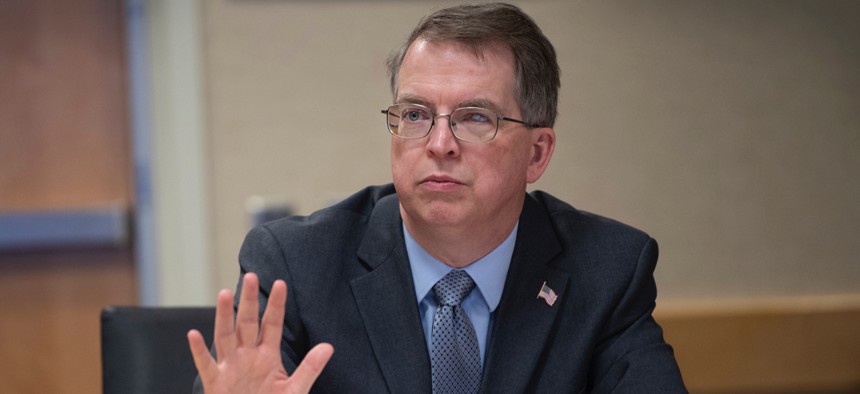Pentagon Delays Budget Deadline to Help Staff Work from Home
Service officials had complained that a June 1 deadline was preventing them from implementing coronavirus-related social-distancing guidelines.
The Pentagon is adjusting its internal budget review process so that more military and civilian personnel can work from home amid the coronavirus pandemic, Defense One has learned.
Instead of requiring the service branches to provide detailed budget requests for fiscal 2022 on June 1, Deputy Defense Secretary David Norquist says each branch needs to submit only “major program change proposals” on that date.
“Services are no longer required to submit a program objective memorandum (POM) on June 1, 2020,” Norquist wrote in an April 3 memo. A POM is the annual budget recommendation from the services and Defense agencies to the Office of the Secretary of Defense.
Norquist is also allowing the services to largely rely on the five-year budget projections presented in the 2021 budget request — which Congress is currently reviewing — as the “baseline” for their 2022 request.
“Services can continue to work their internal Service reviews throughout the summer to identify reforms and offsets,” Norquist wrote in the memo, which was reviewed by Defense One.
The memo sets out a revised schedule for planning DoD’s 2022 budget request: major change proposals are due June 1; “issue nominations” are due June 16; program review will take place from June 16 to Sept. 12; program decisions are to be made by Sept. 12, and the budget is be submitted to the White House on Oct. 12.
The memo was sent five days after Norquist initially said he would not change the schedule and instead asked service officials to come up with alternatives. Army, Navy and Air Force officials said sticking to the original schedule for crafting a 2022 budget well ahead of Election Day was forcing military and civilian employees to regularly come to work, even as top Pentagon leaders urged them to work for home.
“This streamlined approach maximizes [the military] Components’ ability to telework and adhere to social-distancing standards, while also providing the opportunity to incorporate strategic changes and Service-generated reforms,” Norquist wrote in the memo.
One defense official described the delay and other changes to the budget building process as “a great service to the various staffs” inside the Pentagon.
The Army, Navy, and Air Force had all asked Norquist to shift the schedule in recent weeks so more employees could work from home. For some budget officials, that was not possible because they needed to use classified computer networks, which are only accessible in secure facilities, like the Pentagon. Some officials also argued that meeting the original deadline was distracting senior leaders from focusing on COVID-19 response efforts.
“We wanted to look at a little relief with the delivery just because of what the last month has done,” Army Secretary Ryan McCarthy said in an interview on April 2. “To put the proper rigor behind a request of such magnitude like the base budget of a service, you gotta have all the right people around to work your way through it.”
“You gotta be in a position where you can have enough time to deliberate but still deal with a national emergency.”
Meanwhile, frustration was growing among some officials in the building who believed that they were endangering themselves and their staff for routine bureaucratic work.
“The resentment continues to grow at the O-5 and O-6 level and across the civilian staff with [service] leadership for why we are still coming into a building every day,” the defense official said last week.
The added time comes at a particularly uncertain moment for the Pentagon. Some analysts have suggested that that coronavirus pandemic, which has upended daily life across the country, will force a reckoning in how the Pentagon rates its national security priorities.
Rep. Adam Smith, D-Wash., chairman of the House Armed Services Committee, said Tuesday that coronavirus could prevent Congress from passing the 2021 National Defense Authorization Act before the current fiscal year ends on Sept. 30.
“The likelihood that the slips past Oct. 1 is obviously increasing by the day,” Smith said in a call with reporters. “I think you're going to see a lot of the congressional action that was planned for this year shift to the right.”
Meanwhile, Congress is weighing a fourth supplemental funding bill to help coronavirus recovery efforts across the country. Some of the relief funding from previous support bills has gone directly to the Defense Department.
“We need to look at these collective mechanisms if there’s [a fourth] supplemental, or another one after that, and your base budget, at just how you would finance all the challenges you face as well as our ambition to continue to grow the force,” McCarthy said.
“There’s a couple different ways to pay for everything, and that was part of our calculus of saying, we just need a little more time to see how these things play and whether or not it would adjust your prioritization for FY22,” he continued. “Because to make moves like that, it’s a really big deal.”



